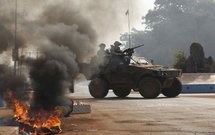 Cameroon is taking steps to secure its frontier after a spate of kidnappings and skirmishes along its borders with Nigeria and the Central African Republic. Beyond the kidnapping of several foreign nationals in northern Cameroon, foreign refugees and fighters have crossed into the country in recent months.
Cameroon is taking steps to secure its frontier after a spate of kidnappings and skirmishes along its borders with Nigeria and the Central African Republic. Beyond the kidnapping of several foreign nationals in northern Cameroon, foreign refugees and fighters have crossed into the country in recent months.
However, the threat the militants pose will likely be contained. They do not have a local support base, they are active only in remote areas of the country and Cameroonian security forces have already taken measures to repel them.
Cameroon saw border clashes with members of Nigerian militant group Boko Haram on Jan. 15 and with former Seleka rebels from the Central African Republic on Jan. 18. In both cases, the fighting incited panic among the local population and prompted a response by the Cameroonian military. The skirmishes have also caused refugees from the respective conflict zones to cross into Cameroon, bringing with them the risk of infiltration by militants.
Rebels from the former Seleka alliance in the Central African Republic, which brought former President Michel Djotodia to power in 2013 until he recently stepped down as part of an effort to quell violence, have occasionally launched attacks on Cameroonian soil.
These cross-border attacks by rebels seeking to avoid security operations by French and African peacekeeping forces in the Central African Republic occurred at different locations on the border, with the most recent attack taking place on Jan. 19 at Garoua-Boulai, a border town through which the main road leading from Cameroon to Bangui passes. On Nov. 18, 2013, Seleka rebels also attacked a village in Cameroon near the location of a separate road leading from Cameroon to Bangui.
But the violence was limited to these border villages, and although the most recent attack at Garoua-Boulai required an intervention by the Cameroonian military, Seleka rebels have not sought or managed to cause sustained threats to Cameroon's security. However, Muslim refugees are crossing into Cameroon to avoid attacks by Christian militias formed in response to the Seleka violence, and former Seleka rebels have been found hiding among refugees. Cameroon has conducted operations to round up these former rebels to prevent them from using Cameroon as a staging ground to resume attacks in the Central African Republic.
Cameroon is trying to protect itself from spillover violence by cooperating with French forces that have mounted an intervention in the Central African Republic. One of the main focuses of the French military operations, apart from securing the capital of Bangui, has been patrolling the road leading from Cameroon to Bangui. France has also used Cameroon as its staging area for operations in the Central African Republic and currently maintains a military presence at the airport of the Cameroonian town of Ngaoundere.
French forces disembarked at the Cameroonian port of Douala and moved heavy equipment and troops closer to the Central African Republic using the Cameroonian rail network, and France has also decided to maintain a forward deployed military contingent made up of paratroopers from the 3rd Parachute Marine Infantry Regiment at Ngaoundere.
These forces may be used to reinforce French soldiers in the Central African Republic if necessary, but their presence in Cameroon, as well as the continued logistical connection between France and its deployed troops in Bangui that runs through the Cameroonian border area, is likely to compel France to keep security at a tolerable enough level that does not threaten Cameroon's stability.
Cameroon has faced similar threats posed by the northern Nigerian Islamist militants of Boko Haram. On Jan. 15, a skirmish took place in northern Cameroon as Nigerian refugees and Boko Haram fighters crossed the border and Nigerian military forces followed them. The Cameroonian military intervened and arrested several suspected Boko Haram members. However, Cameroon has suffered more from the northern Nigerian conflict through a series of kidnappings than through border skirmishes.
A French priest was kidnapped Nov. 13 last year, and a French family of seven was kidnapped Feb. 19. In both cases, the kidnappings allegedly resulted in a ransom being paid for the release of the hostages. This type of activity represents a much more persistent threat to Cameroon, even if it is limited to the remote north of the country, than the limited border skirmishes, especially since the resulting hostage situations are generating revenue for Boko Haram through ransoms.
Boko Haram's kidnappings in the narrow part of northern Cameroon adjoining Boko Haram territory in Nigeria may continue and could harm the Cameroonian tourist sector in the north of the country. But even then, these kidnappings and a slight uptick in Boko Haram violence in Cameroon over the past year are unlikely to threaten economic activity in the south of the country.
The difficult terrain along Cameroon's borders featuring thick vegetation in the east and rough hills in the north, as well as the remoteness of these areas, limits the ability for Cameroon to completely seal its borders and prevent localized threats from occurring. Still, cooperation with the French and Cameroon's assertiveness against the militants will probably prevent the threat of spillover violence from destabilizing the country.
Courtesy : Stratfor (www.stratfor.com)